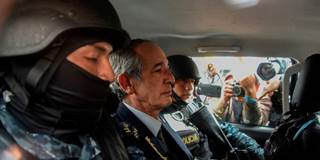From Brazil to Mexico, those tasked with upholding the rule of law are increasingly wielding the administration of justice for partisan purposes. At a time of intensifying political polarization, this does not bode well for Latin America’s future.
PARIS – In April, former Brazilian President Luiz Inácio Lula da Silva surrendered to police to begin serving a 12-year prison sentence for passive corruption and money laundering. It was just the latest in a string of arrests and prosecutions of Latin American political and economic leaders – a trend that began four years ago, with the eruption of the Brazilian Odebrecht Group’s bribery scandal. But while a crackdown on corruption is badly needed, the increasingly politicized approach is placing the entire region on a slippery slope.
With Latin America’s governments and legislatures facing a profound crisis of credibility, the judiciary has become a major player in some countries. In Brazil, for example, figures involved in Operation Car Wash (an ongoing investigation into large-scale corruption at the state-owned oil company Petrobras) – such as Deltan Dallagnol, the lead prosecutor, and Sérgio Moro, the federal judge in charge of the inquiry – have become true political power brokers. Their influence now far exceeds their roles as attorneys, magistrates, or judges of first-instance courts.
The real problem, however, is that officials like Moro have transformed judicial action against corruption into a moral and political crusade, for which they are willing to bend the law. Supreme Court magistrates argue that, in order to get Lula in jail before the 2018 presidential campaign, Moro has disobeyed the rules of criminal procedure and manipulated the mechanisms of preventive detention. Moro himself admits in his verdict that he is convicting Lula without any direct evidence of an illicit act.

PARIS – In April, former Brazilian President Luiz Inácio Lula da Silva surrendered to police to begin serving a 12-year prison sentence for passive corruption and money laundering. It was just the latest in a string of arrests and prosecutions of Latin American political and economic leaders – a trend that began four years ago, with the eruption of the Brazilian Odebrecht Group’s bribery scandal. But while a crackdown on corruption is badly needed, the increasingly politicized approach is placing the entire region on a slippery slope.
With Latin America’s governments and legislatures facing a profound crisis of credibility, the judiciary has become a major player in some countries. In Brazil, for example, figures involved in Operation Car Wash (an ongoing investigation into large-scale corruption at the state-owned oil company Petrobras) – such as Deltan Dallagnol, the lead prosecutor, and Sérgio Moro, the federal judge in charge of the inquiry – have become true political power brokers. Their influence now far exceeds their roles as attorneys, magistrates, or judges of first-instance courts.
The real problem, however, is that officials like Moro have transformed judicial action against corruption into a moral and political crusade, for which they are willing to bend the law. Supreme Court magistrates argue that, in order to get Lula in jail before the 2018 presidential campaign, Moro has disobeyed the rules of criminal procedure and manipulated the mechanisms of preventive detention. Moro himself admits in his verdict that he is convicting Lula without any direct evidence of an illicit act.